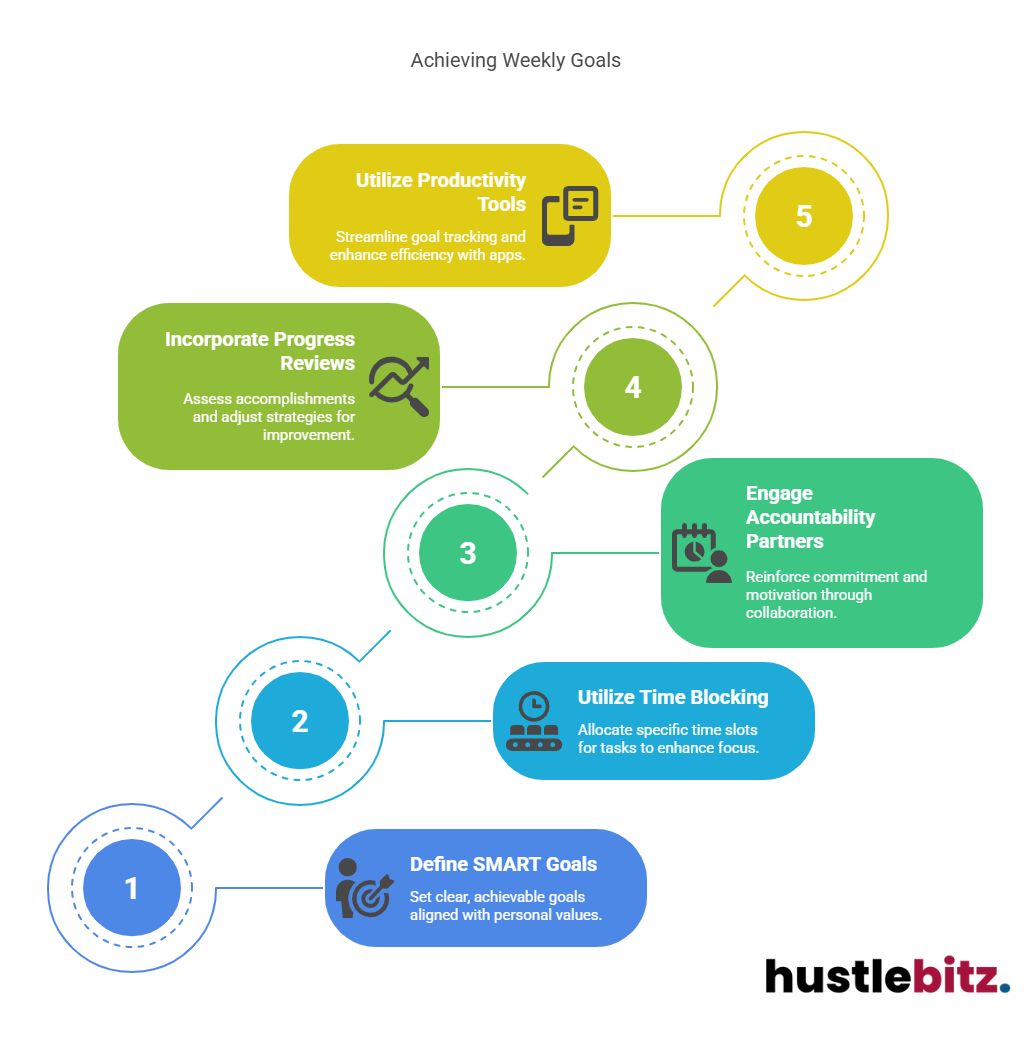Setting weekly goals is a vital strategy for enhancing productivity. It provides a structured framework for task prioritization and reflection on accomplishments. Utilizing SMART criteria ensures that your goals are specific, measurable, achievable, relevant, and time-bound. Breaking down larger objectives into actionable steps facilitates progress tracking. Incorporating accountability partners can bolster commitment and motivation. Moreover, employing tools such as digital planners can streamline your goal-setting process. By creating a coherent action plan, you can navigate challenges effectively while maintaining focus. Discovering additional methods can further amplify your productivity levels and guide you towards success.
Key Takeaways
- Define SMART goals to ensure clarity and alignment with personal values for effective weekly planning.
- Utilize time blocking to allocate specific time slots for tasks, enhancing focus and minimizing distractions.
- Engage accountability partners to reinforce commitment and motivation in achieving weekly goals.
- Incorporate regular progress reviews to assess accomplishments and adjust strategies for continuous improvement.
- Utilize productivity tools and apps to streamline goal tracking and enhance overall efficiency.

Benefits of Weekly Planning

Effective weekly planning significantly enhances productivity by providing a structured framework for prioritizing tasks and managing time efficiently.
This approach allows individuals to engage in weekly reflection, assessing their accomplishments and identifying areas for improvement. By incorporating goal visualization techniques, planners can create a clear picture of what they aim to achieve, fostering a sense of direction.
Time blocking is a crucial strategy within weekly planning, enabling individuals to allocate specific time slots for designated tasks. This method not only minimizes distractions but also enhances focus, creating an environment conducive to productivity.
Moreover, employing mind mapping can facilitate the organization of thoughts and ideas, leading to a more coherent execution of tasks.
Accountability partners can play a pivotal role in this process, as they provide encouragement and motivation techniques that help individuals stay committed to their goals. Progress tracking further reinforces this commitment, allowing individuals to monitor their achievements and adjust their strategies as needed.
The incorporation of reward systems can enhance habit formation, reinforcing positive behaviors and ensuring sustained motivation.
While structure is essential, flexibility strategies should also be integrated into weekly planning. This allows individuals to adapt their plans in response to unforeseen circumstances without losing sight of their overarching objectives.
How to Define Goals

Defining clear and attainable goals is essential for maintaining focus and driving progress in both personal and professional pursuits. To achieve goal clarity, it is crucial to establish objectives that resonate with your personal values and align with your long-term vision. This alignment not only enhances motivation but also ensures that your efforts contribute to meaningful outcomes.
Employing effective motivation techniques can bolster your commitment to these goals. Consider utilizing success metrics to evaluate your progress; measurable outcomes provide tangible benchmarks that facilitate reflection and adjustment. Reflective practices, such as journaling or regular check-ins, can enhance your awareness of what is working and what needs modification.
Incorporating adaptive strategies allows you to be flexible in the face of challenges, ensuring that your goals remain relevant and achievable. Additionally, engaging accountability partners can strengthen your resolve. Sharing your goals with someone who supports your journey can provide encouragement and constructive feedback, fostering a sense of responsibility.
Time management plays a pivotal role in goal achievement. Break your objectives into smaller, actionable steps, and allocate time effectively to ensure consistent progress. This structured approach minimizes overwhelm and allows for a clearer focus on each task.
Ultimately, defining goals with clarity and purpose is a dynamic process that requires ongoing assessment and refinement. By aligning your goals with your values and employing supportive techniques, you can navigate your path toward success with confidence and intention.
Prioritizing Your Tasks
Prioritizing your tasks is a critical step in maximizing productivity and ensuring that your efforts align with your overarching goals. The process begins with task categorization, where tasks are grouped based on their importance and urgency. This creates a clear framework for determining which tasks should be tackled first. Utilizing urgency assessment helps to identify tasks that require immediate attention versus those that can be scheduled for later.
Implementing time blocking can significantly enhance your focus techniques. By allocating specific time slots for each task, you can minimize distractions and maintain a steady workflow. Additionally, energy management plays a crucial role; tackle high-priority tasks during peak energy periods to optimize performance.
Incorporating delegation strategies can also alleviate the burden of overwhelming workloads. Identify tasks that can be delegated to team members, freeing up your time for more critical responsibilities. Regularly practicing obstacle identification allows you to foresee potential challenges and adapt accordingly.
To maintain motivation and accountability, consider establishing reward systems for completed tasks and enlisting accountability partners. This not only fosters a sense of accomplishment but also encourages collaboration and support.
Lastly, progress tracking is essential for refining your approach and ensuring that your priorities align with your long-term objectives. By prioritizing tasks effectively, you can navigate your weekly goals with purpose, enhancing both productivity and satisfaction in your work.
Setting SMART Goals
Establishing SMART goals—specific, measurable, achievable, relevant, and time-bound—provides a structured framework that enhances clarity and focus in your productivity efforts. By utilizing the SMART criteria, you can ensure that your goals are well defined and aligned with your broader objectives. This alignment is essential for fostering motivation and commitment.
When setting your weekly goals, consider breaking them down into measurable outcomes and achievable targets. This not only aids in goal visualization but also facilitates performance tracking. For example, having a specific target of completing a certain number of tasks can help you stay on track throughout the week.
The table below illustrates how to apply the SMART framework effectively:
| SMART Criteria | Example Goal |
| Specific | Increase client outreach efforts |
| Measurable | Contact 15 new clients this week |
| Achievable | Allocate 2 hours each day for outreach |
| Relevant | Aligns with overall sales strategy |
| Time-bound | Complete by the end of the week |
Incorporating accountability partners can further enhance your success measurement, as sharing your goals with others fosters a sense of responsibility. By setting relevant objectives with clear time-bound deadlines, you create a roadmap for success that maximizes your productivity. Ultimately, applying the SMART framework equips you with the essential tools to achieve your weekly goals effectively.
Creating an Action Plan

Once you have set your SMART goals, the next step involves creating an actionable plan to systematically achieve these objectives. This plan should outline specific actionable steps that will lead you toward your goals. Effective time management is crucial here; allocate your resources wisely, ensuring that each task receives the attention it deserves.
Incorporating accountability partners can significantly enhance your commitment. Share your goals with someone who can provide encouragement and hold you accountable. Regular progress tracking is essential for assessing how well you’re moving toward your objectives. Establish milestones that allow for success measurement, enabling you to celebrate achievements along the way.
Flexibility adjustments are equally important, as unexpected challenges may arise. Be prepared to modify your plan as needed without losing sight of your long-term vision. Employ motivation techniques, such as visualizing your success or rewarding yourself for small wins, to maintain enthusiasm and focus throughout the process.
Additionally, consider implementing daily reflections to evaluate your progress and identify areas for improvement. This practice not only reinforces your commitment but also sharpens your skills in self-assessment.
Tools for Goal Setting

Effective goal setting requires the use of various tools that can enhance clarity, focus, and accountability in achieving desired outcomes. A combination of digital and traditional methods can significantly improve your productivity. Here are some effective tools to consider for your goal-setting journey:
| Tool Type | Description | Benefits |
| Digital Planners | Applications designed for goal tracking and time management. | Streamlines tasks, fosters goal alignment. |
| Journaling Techniques | Writing reflections and notes on progress. | Enhances goal visualization, motivation strategies. |
| Accountability Partners | Partners who support and challenge you in your goal pursuits. | Increases accountability, encourages progress reviews. |
Utilizing productivity apps can simplify the process of goal tracking and ensure that you remain organized. These tools often include features such as reminders and progress charts that help maintain focus. Digital planners offer a comprehensive way to visualize your goals, while journaling techniques allow for introspection and reflection on your journey.
Establishing regular progress reviews is essential for understanding what works and what needs adjustment. This practice not only promotes accountability but also helps in maintaining motivation as you witness your advancements. Engaging with accountability partners can provide encouragement and fresh perspectives, ultimately enhancing your commitment to your goals. By integrating these tools into your routine, you can significantly improve your goal achievement and overall productivity.
Final Thoughts
Setting weekly goals is a powerful way to stay organized, focused, and productive. By using strategies such as SMART goal-setting, time blocking, and accountability partnerships, you can break down larger tasks into manageable steps, making it easier to stay on track. Consistently reviewing your progress and adjusting your action plan helps maintain flexibility while staying aligned with your long-term objectives. Tools like digital planners and journaling can enhance your goal-setting process, while accountability partners offer support and encouragement. With the right approach, weekly goals can guide you toward greater efficiency and personal success.




